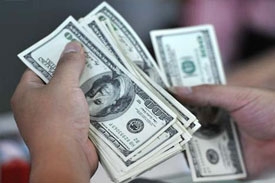State Bank plans to increase dong to dollar value
 "Since February, the real value of Vietnamese dong has risen slightly," Binh said.
"Since February, the real value of Vietnamese dong has risen slightly," Binh said.
"If necessary, the central bank will consider further adjustment of the exchange rate," he added. "The primary target of foreign exchange policy is to stabilise the dong and keep it under control, not to fix it. Confidence in the domestic currency has been fading and we must immediately restore that confidence, which is vital to economic stability."
Binh advised the public that holding onto the dong was the best policy to keep people from flocking to invest in gold and to reduce dollarisation of the economy.
Strategies to protect the dong would include deposit interest rate reform that created predictable interest rates at levels of around 14 per cent for dong deposits and 2 per cent for US dollar deposits, he said.
Recent dollar speculation on the foreign exchange black market was a move to take advantage of soaring global gold prices, he added.
"In fact, the demand for dollars to pay for imports is not high, and even petrol importers are not demonstrating a high demand for dollars," Binh said. "The nation's foreign reserves are sufficient to offset any imbalance in the supply of and demand for dollars."
The central bank bought up over $4 billion in the first seven months of the year. At the Consulative Group Meeting in June, the International Monetary Fund estimated that Vietnam 's foreign reserves totalled $13.5 billion, equivalent to 1.5 months of imports. On August 14, banks quoted buy/sell rates of 20,814 VND/20,824 VND per dollar, while the greenback traded for under VND21,000 on the black market.
On August 9, as domestic gold prices soared to an all-time record of VND46 million ($2,203) per tael, the dollar was traded at VND21,300 on the black market and around VND20,810 at banks.
What the stars mean:
★ Poor ★ ★ Promising ★★★ Good ★★★★ Very good ★★★★★ Exceptional
Latest News
More News
- Hermes joins Long Thanh cargo terminal development (February 04, 2026 | 15:59)
- SCG enhances production and distribution in Vietnam (February 04, 2026 | 08:00)
- UNIVACCO strengthens Asia expansion with Vietnam facility (February 03, 2026 | 08:00)
- Cai Mep Ha Port project wins approval with $1.95bn investment (February 02, 2026 | 16:17)
- Repositioning Vietnam in Asia’s manufacturing race (February 02, 2026 | 16:00)
- Manufacturing growth remains solid in early 2026 (February 02, 2026 | 15:28)
- Navigating venture capital trends across the continent (February 02, 2026 | 14:00)
- Motivations to achieve high growth (February 02, 2026 | 11:00)
- Capacity and regulations among British areas of expertise in IFCs (February 02, 2026 | 09:09)
- Transition underway in German investment across Vietnam (February 02, 2026 | 08:00)
















 Mobile Version
Mobile Version